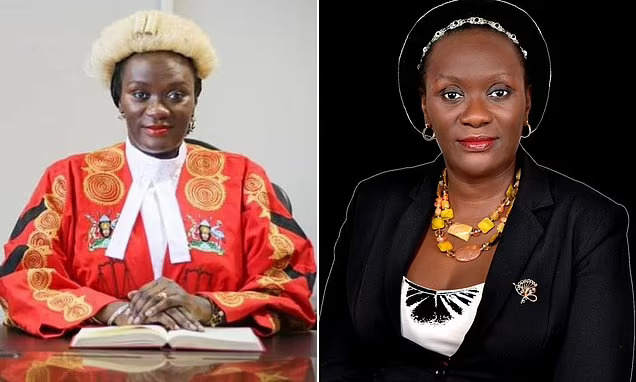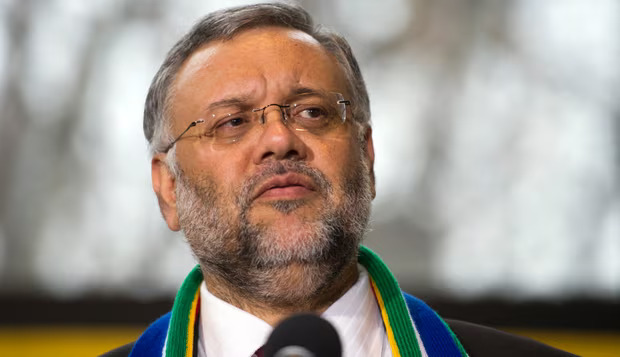In Namibia, President Nangolo Mbumba has officially enacted a new Marriage Act, which includes several notable provisions, including the prohibition of same-sex marriages.
The legislation defines marriage strictly as a union between a man and a woman, and it extends this restriction to the non-recognition of same-sex marriages performed in other countries. This development has sparked significant debate within the country, particularly within legislative circles.
Earlier in 2023, Jerry Ekandjo, a Swapo member of parliament, presented several Bills in the National Assembly that proposed criminalising the promotion, solemnisation, and propagation of same-sex marriages. Additionally, these Bills sought to redefine the term “spouse.”
In a landmark ruling the previous year, the High Court annulled the colonial-era “sodomy” and “unnatural offences” laws, which had previously criminalised same-sex sexual relations between consenting adults.
Opponents of the new legislation argue from a moral standpoint, while supporters often frame their argument in terms of human rights. The Bills passed through both the National Assembly and National Council with overwhelming support, garnering more than a two-thirds majority vote, without any objections or abstentions.
The 2024 Marriage Act (No. 14) brings in sweeping changes, particularly regarding the process for announcing intended marriages. The new law establishes more rigorous requirements for public notification of marriages, designed to enhance transparency and prevent fraudulent unions.
Under the previous Act, a physical notice at a local magistrate’s office or church sufficed. The new law, however, mandates that marriage intentions be publicly displayed both online and at designated physical locations. The public notice must include essential information, such as the full names, birthdates of the parties, the date and venue of the wedding, and contact details for anyone wishing to object.
Daniel Kashikola, then the Deputy Minister of Home Affairs, had pointed out during discussions that the old system was insufficient, leaving room for unauthorised marriages. He highlighted cases where individuals entered into fraudulent marriages for financial reasons, and others, especially women, found themselves in situations where they were promised marriage only to discover their partner was already married to someone else.
The new legislation stipulates that the public notice must remain visible for at least 21 days, providing the public sufficient time to lodge objections. In certain circumstances, couples may apply for a waiver, but the registrar general must make a decision within five days based on the urgency and evidence presented. Failure to comply with these notification requirements could result in fines of up to N$10,000, a two-year prison sentence, or both.
Additionally, the law introduces a mandatory pre-marriage confirmation valid for 90 days, which can be renewed only once for another 90 days. If the confirmation expires before the wedding takes place, the marriage cannot proceed.
Another significant aspect of the Act is its restriction on child marriages, now forbidding marriages for individuals under 18 and imposing stricter consent rules for those under 21. Individuals between 18 and 20 must obtain written consent from their parents, guardians, or an authorised representative. In cases where consent cannot be obtained, a children’s commissioner may grant permission under specific conditions, such as when parents are deceased or unable to consent due to illness.
Human rights activists and lawyers have condemned the new legislation, calling it a step backward for equality and human rights. Linda Baumann, an activist, argued that the Act institutionalises discrimination against LGBTQI+ individuals, denying them the right to marry and undermining their family rights. She stressed that the law contradicts Namibia’s constitutional principles of equality and urges civil society to challenge the legislation through advocacy and legal means.
John Nakuta, a human rights lawyer, pointed out that the Act violates the right to marry enshrined in Namibia’s Constitution. He also noted that the law’s provision rejecting the recognition of same-sex marriages performed abroad overrides a previous Supreme Court ruling, which recognised the marriages of same-sex couples married in countries like South Africa and Germany.
Nakuta and others, including Legal Assistance Centre director Toni Hancox, emphasised that the law infringes upon basic human rights, particularly the rights to equality, dignity, and family.
Meanwhile, the US has also seen significant policy changes under its new president, Donald Trump, who issued executive orders aimed at reversing several Biden-era directives. Among these were measures to remove protections against discrimination based on gender identity or sexual orientation, as well as an order recognising only two genders, male and female, and prohibiting changes to gender identity.



